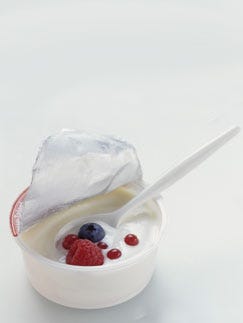MuCell Extrusion creates strategic alliances with Dow, Styron
MuCell Extrusion President Mark Lindenfelzer said confusion due to patent and licensing obligations has inhibited the growth of some applications for his company's technology in the marketplace."There is an issue in the marketplace of who owns what in terms of technology," Lindenfelzer told PlasticsToday. "There are a number of patents in the marketplace and sometimes the end user is not sure how to handle all the intellectual property. With these two agreements, we hope to help clarify that issue."
August 8, 2012
MuCell Extrusion President Mark Lindenfelzer said confusion due to patent and licensing obligations has inhibited the growth of some applications for his company's technology in the marketplace.
"There is an issue in the marketplace of who owns what in terms of technology," Lindenfelzer told PlasticsToday. "There are a number of patents in the marketplace and sometimes the end user is not sure how to handle all the intellectual property. With these two agreements, we hope to help clarify that issue."
The first agreement is for MuCell to exclusively license Dow Chemical thin foamed films patent family, using MuCell foaming technology to create physically foamed films for all film applications.
The second one is to acquire access to Styron's patent portfolio for extrusion of styrenic resins.
MuCell works with customers through the engineering and design phases to ensure that the customers' screw, barrel, gas injector, or die is working without flaws. MuCell does not sell additives, polymers, or finished products.
Strategic alliance with Dow
MuCell's contract with Dow seeks to eliminate existing confusion among potential customers as to patent and licensing obligations while at the same time, provide a clear demarcation of responsibilities for support of these foaming technologies. Dow will continue to offer resins specially formulated to optimize foaming results while MuCell will provide hands-on technology transfer equipment and technical support to customers.
"We provide expertise in process development and equipment packages necessary to implement the technology, and Dow offers formulation expertise in resins to streamline the process," Lindenfelzer said. "This agreement not only marries two steps in the value chain, supply and processing, but that all of the relevant intellectual property for both film and flat sheet resin technology has now been bundled into one source."
Lindenfelzer said stand-up pouches are a key area they will be targeting.
This agreement follows a similar strategic agreement from earlier this year, wherein Dow and MuCell reached an agreement for MuCell to exclusively license Dow's patent family on flat sheet resin technology.
MuCell signs exclusive license with Styron
 This agreement gives MuCell and its customers exclusive rights to the Styron patents related to sheet technology for a wide variety of applications.
This agreement gives MuCell and its customers exclusive rights to the Styron patents related to sheet technology for a wide variety of applications.
"Styron did control some patents that were key," he said. "We really needed Styron's intellectual property to convert the process across the world and allow it to run without violating properties."
The combination of Styron's CO2RE technology and MuCell's expertise around technology and hardware is expected to help customers improve their competitive advantage in a shorter timeframe, the company stated. Sheet for thermoforming, FFS, roll stock, paneling and high volume packaging could see cost reductions by applying this technology.
CO2RE is a patented plastic foaming technology that produces polystyrene sheets with a foamed core layer using physical blowing agents. The technology targets the packaging market, for example dairy and food service industries, where they can reduce the density and weight of their product packaging as well as lower packaging waste disposable tax in the EU.
Lindenfelzer said a main goal for almost every customer is a reduction of weight in packaging. He said MuCell has the ability to take 20% weight out of the structure without affecting mechanical proprieties to fill the package.
MuCell technology is based on the direct injection of atmospheric gas (N2 or CO2) in its supercritical state. MuCell has applied this technology to most plastic materials and processes. Rigid sheet, low-density flexible sheet, blown film, cast film, pipe/tubing/profile, and blowmolding manufacturing processes are all current applications using MuCell technology.
"We believe it's a seamless transition from the first discussion into actually making a product," Lindenfelzer said. "This technology pays back almost immediately to customers and that's what makes it powerful."
About the Author(s)
You May Also Like


